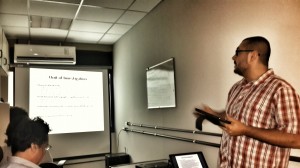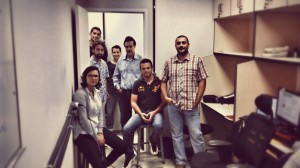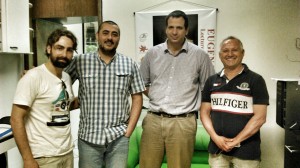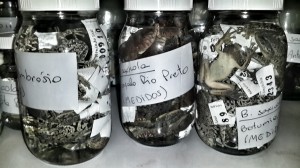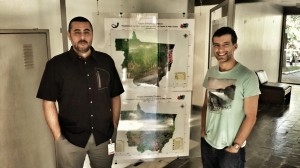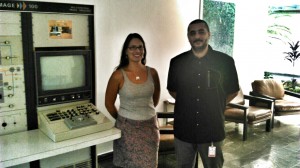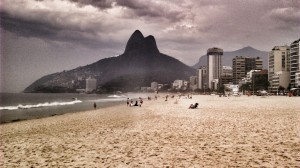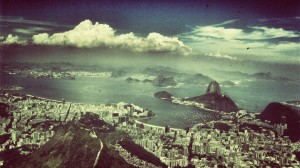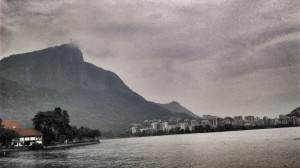Have Fun While Modelling Biodiversity Loss!!
By Luca Budello on Saturday, November 29th, 2014
I was recently awarded funding from NERC’s Partner Engagement scheme to visit INPE, The Brazilian National Institute of Space Research in Sao Jose Dos Campos. As my supervisor, Dr. Guy Ziv from the School of Geography, was also heading to Brazil with the support of a grant from the Royal Society International Exchange Scheme, we decided to combine the two events and organise a wider networking tour of Brazilian research organisations that work in the area of Land Use Change (LUC) modelling, carbon modelling, remote sensing, policy and their implications to the wider issue of Amazon deforestation.
This trip has so far helped me to develop a better perspective of what is perceived as current amongst the Brazilian research community on the causes and implications of deforestation and natural resource management in Brazil, network widely, establish new collaborations, find novel datasets and shape my PhD research proposition in ways I did not think it was possible before my departure.
I am now aware that while the causes and processes of LUC is a crowded research space, the impact of those anthropogenic drivers on the persistence of biodiversity is very much an overlooked area, which requires more research output in support of policy development.
I started my trip with a week-long visit to the Institute of Geoscience at the Universidade Federal de Minas Gerais (UFMG) in Belo Horizonte. Particularly, I spent most of my time networking with the large and prolific research group led by Britaldo Soares-Filho, which work provides the global research community with some of the most advanced LUC modelling tools and ideas. Here, I made a presentation about my proposed doctoral research and sparked a lively discussion on the validity of my research questions and how to integrate LUC issues with Species Distribution Modelling (SDM) in order to understand the response of different measures of biodiversity to anthropogenic change.
One of the limitations of my proposed research project prior to this visit was reliable species distribution data, which are very undocumented and scarce in Brazil. Guy and I have been researching the web widely in search of these datasets, which were nowhere to be found. However, thanks to the impressive contacts of Fernando Goulart, one of the post-doc researchers in Britaldo’s group, I also had the chance to meet with Professor G. Wilson Fernandes at the Evolutionary Ecology and Biodiversity’s Institute and other scientists whose research interests are very closely aligned to mine. They all pointed out to this dramatic lack of species datasets and I was surprised (and delighted) to find out that Ubeirajara, a PhD researchers at the Zoology department, had just finished the mammoth task of compiling, cleaning up, verifying and standardising sparse and unreliable Brazil-wide datasets into a taxonomically reliable database comprising over 60 thousand species. A gold mine….
Fernando & Britaldo’s (and of course Guy)’s insight of the current policy framework, often hidden to outsiders, and he willingness of the ecological community to share their time, ideas and datasets have opened up new directions to my proposed project that I could only dream off before this trip.
Whit this new ideas and availability of datasets I then travelled to INPE where I have been exposed to even more ideas and opportunities. The INPE campus is extremely large and well manicured. It is situated within a military base and the registration process to enter it was as daunting as travelling through JFK Airport in New York (those who did it can understand the pain). Here we initially met with another high impact group led by Dr. Ana Paula Dutra Aguilar and one of her post-docs, Eloi Dalla-Nora gave us an introductory presentation of his research, which is of the finest quality. His novel LUC modelling framework aims to understand the impact of policy and global market drivers acting on deforestation. We also met with Dr. Liana Anderson at the Tropical Ecosystems and Environmental Science Group (TREES) and other scientists working on the impact of LUC on biodiversity as well as developing new remote sensing products to understand post-deforestation land use transitions (i.e. Forest-to-Pasture-to-Soy). This was actually one of the main reasons for this trip as I aim to use this dataset called TERRAclass to define the impact of those transitions on the connectivity of species. One of the developer of this product, Dr. Andrea Lima, also provided me with a closer look to it and insight on future plans. Both Guy and I gave presentations on our work and initiated broad discussions on potential opportunities for a future internship in a year or two.
It has been a very interesting and formative 2 weeks here in Brazil, and a lot of new and exciting ideas are now emerging. The opportunity to travel and engage varied research groups so earlier on in my PhD is not very common and I would suggest other doctoral candidates and their supervisors to make these trips available, as they are really invaluable to shape up a research project. Before this trip my research project was very much up in the air; now I look very much forward to the next few months leading to my transfer.
Now, however, a little bit of rest is what is needed before embarking on this long journey. Thus…..
From Rio de Janeiro with Love !!!!




